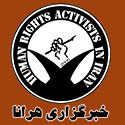2009-05-03
On 24 November, prison guards entered Farzad Kamangar’s cell in Section 209 of Tehran’s Evin prison.
It is reported that the prison guards beat Farzad Kamangar, threatened him with execution, and took him out of the cell, along with some of his personal belongings. Later that day, another prisoner reported seeing him in the prison clinic, apparently unconscious.
He is now believed to have been returned to his cell. In Iran, the removal of a detainee from their cell often signals that the person may be executed imminently. Amnesty International is therefore concerned that despite a review of his case being underway, Farzad Kamangar remains at risk of execution.
Farzad Kamangar was arrested by Ministry of Intelligence officials along with two other members of the Kurdish minority, Ali Heydariyan and Farhad Vakili, in Tehran around July 2006. The three men were sentenced to death on 25 February 2008 after being convicted of “moharebeh” (enmity towards God), a charge levelled against those accused of taking up arms against the state, in connection with their alleged membership of the armed group, the Kurdistan Workers Party (PKK).
Ali Heydariyan and Farhad Vakili also received additional sentences of 10 years’ imprisonment for forging documents. Under Iranian law, they must serve their prison sentences before being executed. The death sentences of all three men were upheld by the Supreme Court.
However, Farzad Kamangar’s lawyer has submitted his case to a judicial review panel in an effort to have his death sentence overturned. Under Iranian law, death sentences cannot be carried out while under review
It is reported that the prison guards beat Farzad Kamangar, threatened him with execution, and took him out of the cell, along with some of his personal belongings. Later that day, another prisoner reported seeing him in the prison clinic, apparently unconscious.
He is now believed to have been returned to his cell. In Iran, the removal of a detainee from their cell often signals that the person may be executed imminently. Amnesty International is therefore concerned that despite a review of his case being underway, Farzad Kamangar remains at risk of execution.
Farzad Kamangar was arrested by Ministry of Intelligence officials along with two other members of the Kurdish minority, Ali Heydariyan and Farhad Vakili, in Tehran around July 2006. The three men were sentenced to death on 25 February 2008 after being convicted of “moharebeh” (enmity towards God), a charge levelled against those accused of taking up arms against the state, in connection with their alleged membership of the armed group, the Kurdistan Workers Party (PKK).
Ali Heydariyan and Farhad Vakili also received additional sentences of 10 years’ imprisonment for forging documents. Under Iranian law, they must serve their prison sentences before being executed. The death sentences of all three men were upheld by the Supreme Court.
However, Farzad Kamangar’s lawyer has submitted his case to a judicial review panel in an effort to have his death sentence overturned. Under Iranian law, death sentences cannot be carried out while under review




